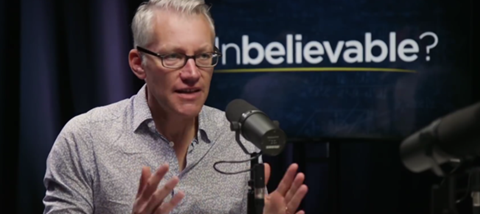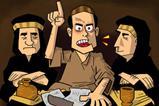Best-selling historian and author Tom Holland responds to the latest British Social Attitudes survey which shows declining Christianity and rising atheism

The success of Christianity, the most influential framework for making sense of human existence that has ever existed, has always depended on people who tend not to feature in history books. It was not in churches, or monasteries, or universities that the mass of the Christian people were most influentially shaped. Rather, it was in the home that children were likeliest to absorb the revolutionary teachings that, over the course of 2,000 years, have come to be so taken for granted as almost to seem human nature.
Down the generations, down the centuries, down the millennia these teachings have been passed. Only Jews can lay claim to anything comparable: a living tradition that can be traced back along an unbroken line to the long-vanished civilisation of the Roman Empire.
No one, then, should doubt the significance of a trend highlighted in the annual British Social Attitudes survey which came out last week. The bonds which for a thousand years and more have joined each new generation born in this country to its Christian past are fraying with a vertiginous speed. Church-going parents now have only a one in two chance of raising children who, as adults, will attend church themselves.
As the number of people in Britain who identify as Christian plummets, so familiarity with even the most basic knowledge of Christianity fades with them. Ignorance of stories, rituals and teachings that for long had seemed so thoroughly woven into the fabric of this country’s culture as to be indistinguishable from it, is now increasingly the norm.
None of which means that the assumptions which govern and structure British society have ceased to be Christian. The people who, in Nietzsche’s famous fable, continue to venerate the shadow of God are not merely church-goers. All those in thrall to Christian morality – even those who may be proud to array themselves among God’s murderers – are included among their number.
Agnosticism – as Thomas Henry Huxley, the man who coined the word, readily acknowledged – ranks as “that conviction of the supremacy of private judgment (indeed, of the impossibility of escaping it) which is the foundation of the Protestant Reformation.” Secularism owes its existence to the medieval papacy. Humanism derives ultimately from claims made in the Bible: that humans are fashioned in God’s image; that his Son died equally for everyone; that there is neither Jew nor Greek, slave nor free, male nor female, for all are one in Christ Jesus.
Repeatedly, like a great earthquake, Christianity has sent reverberations across the world. First there was the primal revolution: the revolution preached by Saint Paul. Then there came the aftershocks: the revolution in the 11th century which set Latin Christendom upon its momentously distinctive course; the revolution commemorated as the Reformation; the revolution which killed off God. All bore an identical stamp: the aspiration to enfold within its embrace every other possible way of seeing the world; the claim to a universalism that was culturally highly specific.
The degree to which self-confessing-atheism in Britain, far from serving as an emancipation from the country’s traditional religious culture, tends instead to function as yet another Protestant sect is evident in the very language it employs to hail Christianity’s rout. Just as Puritans welcomed the decline of popery, so now do atheists welcome the decline of Christianity itself. “Superstition and unreason are on the retreat.” Such was the spin that Polly Toynbee, in The Guardian, put upon the BSA report. Anyone familiar with the rhetoric of the Reformation will immediately recognise the sentiment.
Toynbee, though, should be careful what she wishes for. That human beings have rights; that they are born equal; that they are owed sustenance, and shelter, and refuge from persecution: these are not at all self-evident truths. “There is nothing particular about man. He is but a part of this world.”
Today, in the West, there are many who would agree with Heinrich Himmler that, for humanity to claim a special status for itself, to imagine itself as somehow superior to the rest of creation, is an unwarrantable conceit. Homo sapiens is just another species. To insist otherwise is to cling to the shattered fragments of religious belief. Yet the implications of this view – which the Nazis, of course, claimed as their warrant for genocide – remain unsettling for many to face.
Just as Nietzsche had foretold, freethinkers who mock the very idea of a god as a dead thing, a sky fairy, an imaginary friend, can still piously hold to taboos and morals that palpably derive from Christianity. Increasingly, though, as the flood-tide of Western power and influence ebbs, the illusions of European and American liberals are coming to be left stranded. Much which they have sought to cast as universal now stands exposed as never having been anything of the kind. Behind the readiness to use ‘fascist’ as an insult there lurks a numbing fear: of what might happen should it cease to be taken as an insult.
If secular humanism derives, not from reason or from science, but from the distinctive course of Christianity’s evolution – a course that, in the opinion of growing numbers in Europe and America, has left God dead – then how are its values anything more than the shadow of a corpse? What are the foundations of its morality, if not a myth?
Generally, if you are sitting on a branch, it is not sensible to saw it through.




































1 Reader's comment